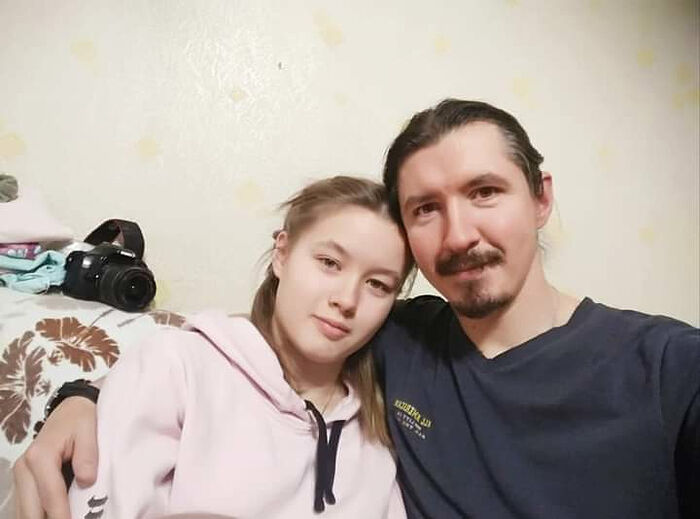Priest Viktor Gavrish was born in 1985 in the village of Malaya Dubna in the Orekhovo-Zuyevo district of the Moscow region. In 2001 he graduated from high school and in the same year entered the Kolomna Theological Seminary. In 2006 he was ordained deacon and in 2007 priest. He served at the Church of Blessed Matrona of Moscow in the Orekhovo-Zuyevo district, then at the Church of the Icon of the Mother of God “Abbess of Mount Athos” in the Taldom District. Now he serves at the Church of the Archangel Michael in the town of Taldom. He is married with three children.
 Wedding of Viktor Gavrish and his wife Anna
Wedding of Viktor Gavrish and his wife Anna
—Young people often wonder how to find their other half. Could you share your story of how you met your wife?
—We first met in a typical way for young believers—at church. As a fourth-year seminarian I went to visit a friend, a fellow seminarian, for two days. He invited me to the church where he helped the priest. During the service the priest invited me to read on the kliros. Several young ladies sang in the choir, and after the service we all went for a stroll. The weather was fine, and this church is quite far from the town—we had to walk several miles. We started talking while walking. By that time (it was 2004) I had just read a book by one popular author. One of the girls, Anna, told me that she, too, had such a book, and we started talking about it. Thus I struck up an acquaintance with her. Then I went to a summer youth camp in the Taldom district. I went there as a leader, and Anna as a leader of a different group. We had two weeks to communicate and get to know each other better. Then I proposed to her. We got married six months later. Now I think that it was probably too early, but at that moment it did not seem so.
—Your union of eighteen years is time-tested. How can young men and women understand that they have found the one with whom they will walk hand in hand through life?
—It seems that the question is not to find some unmistakable algorithm that will help you choose a life partner, but in your inner readiness for a responsible attitude. You can see someone and go head over wheels for him or her right away, but it will be infatuation, emotion. A person might say: “It was love at first sight, which took my breath away.” But two or three (sometimes even ten) years of marriage pass, and the spouses see that they are complete strangers. I think that it is important to have common interests and to be on the same wavelength.
What helped us is that we were both believers, shared the same values and spoke the same language. We read the same books, discuss them, watched and still watch the same movies and talk about them. We enjoy each other’s company, we always have topics for conversation, and we don’t communicate only about raising children and domestic things. There must be friendship at the first stage of communication. If this stage ends too quickly and grows into a romantic relationship, it means that the young people jumped over this step, and after some time it turns out that they have different outlooks on life and their views don’t concur. In this case their relationship will have to stand a hard test. Of course, people can take efforts and eventually find common ground, but it will be much more difficult for them. I think that before they start dating, they should just be friends and talk more for a certain period of time, seeing what their potential life partner lives by. It’s no secret that romantic feelings immediately put rose-colored glasses on a person—he won’t notice anything negative and won’t be able to evaluate anything objectively.
 Anna —Father Victor, does your wife work? What is her profession?
Anna —Father Victor, does your wife work? What is her profession?
—Anna graduated from Dubna State University near Moscow (Department of Social Work). She did not work as long as the children were small. Now they have grown up, aged seventeen, fourteen, and ten. All of them are students; they can warm up their lunch on their own and take care of themselves; so for four years now my wife has worked in her field.
The Department of Social Work is the organization and management of volunteer movements and social aid to people. During lockdowns this kind of work was very relevant. We had an active volunteer movement in Dubna, which provided aid to lonely parishioners; this experience is invaluable. Now Anna works in the social assistance service for lonely elderly people and war veterans.
—Today many mothers of large families and clergymen’s wives work, doing interesting things that they enjoy. Nevertheless, some hold to the point of view that the main “work” of a mother and a wife is domestic chores. What would you say about that?
— The Lord endowed all people with talents, and it would be wrong to bury your talents. Many people cite the Apostle Paul and argue that the woman is saved through childbearing. That’s true, but if we look at this matter more broadly, we will see that it includes not only pregnancy and the birth of a child, but also his proper upbringing. Can a poorly educated woman give much to her children? If her horizons are narrow, if she has not read any books other than those that were necessary at school and if she does not develop, she will give much less intellectually to her sons and daughters.
Doing interesting work is important for any person. The stereotype that a wife should stay at home, only cooking and doing other household chores, is outdated. We now live in a different society.
There can also be a favorite profession in which a person realizes his potential, and it brings him joy. Why can’t a woman do that? Of course, when her children are small, it is hard for a mother to fulfil her talents, because she takes care of them. But there are opposite situations. I personally know instances when the father took care of children, because his wife had a good position and a high salary. Upon consideration the spouses decided that it was best for the husband to take paternity leave to care for the baby. The family had a mortgage, and the wife could pay for it. The father did everything conscientiously, taking the children to hobby groups and clubs, walking with them, etc. It lasted several years, and then he returned to work. His authority as the head of the family was not undermined by this. On the contrary, he began to understand his other half better, and she saw in him an example of a sacrificial attitude towards family.
This is an example from real life; they are a conservative religious Orthodox family. Such were the circumstances. I don’t think there is anything wrong here. Moreover, a woman can have a talent for some kind of activity.
 I know a woman who at the age of thirty-five began to paint beautifully, although she had never tried to do it before. Now she has already had several exhibitions. She first took up a brush just for interest to cope with her postpartum depression after the birth of her fifth child. With so many children she had suffered a nervous breakdown. The physician told her: “You need to take pills and give your nervous system a break. Paint pictures, for example.” She bought paints and brushes and started painting. Now she paints professionally. Many women have good organizational skills. If someone’s wife has a small business and knows how to run it, is it bad?
I know a woman who at the age of thirty-five began to paint beautifully, although she had never tried to do it before. Now she has already had several exhibitions. She first took up a brush just for interest to cope with her postpartum depression after the birth of her fifth child. With so many children she had suffered a nervous breakdown. The physician told her: “You need to take pills and give your nervous system a break. Paint pictures, for example.” She bought paints and brushes and started painting. Now she paints professionally. Many women have good organizational skills. If someone’s wife has a small business and knows how to run it, is it bad?
I will give one more example from life. There is a priest whose wife owns her business. They are a well-to-do family, although he is an ordinary clergymen and not the rector of a large city church; but his wife with an organizational and business streak opened her own business. Now the husband is able to devote more time to his priestly duties, visiting the elderly in hospitals and lonely sick people at home, giving talks at educational institutions, and so on. He does not think about how to provide for his family and does not seek where to celebrate more services of need in order to pay for the children’s developmental activities.
—It is hard to combine child-raising and domestic chores with professional ambition. What can you recommend?
—A sensible husband should give such an opportunity to his wife. He can tell her: “I’ll free up time for you and take the children for a walk or classes.” Or he will find another opportunity—say, the mother will do part of the housework or activities with the children, or maybe they will hire a nanny. And the “only children and household cares” stereotype seems wrong to me. If you like it, then fine. I know religious families where the wife has never worked over her twenty years of family life. Although she has a higher education, both spouses are satisfied. But in some situations it is not suitable. There cannot be a pattern that everyone would have to follow.
—How do you spend time with your family? Do you manage to discuss something with the children and talk on different topics?
—We love watching family movies: Soviet, Russian and American ones, old and new, funny and not very funny. We recently watched “We Bought a Zoo” with Matt Damon and we loved it.
Now we sometimes watch different movies with the older and the younger children. For example, the fourteen-year-old Seryozha is not interested in what his youngest sister, who is ten, will like. We choose movies by turn—first he suggests a film, then I.
We always talk after watching. After the film “Groundhog Day”, my son and I discussed the message and the philosophy of this movie. We watched the film “The Bucket List” with Morgan Freeman playing the title role. One day Seryozha came up to me and said that he had seen the film “One Flew Over the Cuckoo’s Nest” at his uncle’s. He said: “The plot is interesting, I’d watch it with you.” I myself had seen this picture five times. The film aroused a lively interest in my son. Actually, he prefers a different format: we watch “Marvel” with him—blockbusters with superheroes who save the universe.
When parents try to show their children only Orthodox movies, at some point they get surfeited and reject them. True, until a certain age daughters and sons will watch the movies shown by grown-ups and discuss them, but this will not be their inner urge—they will do it because the parents insist. It’s good when there is dialogue, when the situation is like this: We choose together, watch together and discuss together. My older children and I also watched “The Matrix”—the first two parts of the franchise. It led to a lively discussion about the structure of the universe and the reality of the virtual world. It is a big problem—teenagers do not talk much with their parents. Adults complain: “Oh, all your action movies are boring to me...” And the younger generation replies: “Oh, your long-winded ‘black-and-white’ films are dull too!”
And with our eldest daughter we watched a very beautiful Korean historical drama, “Empress Ki”. I would advise parents of teenagers to give up your time and watch it together. At first I thought: I’ll watch two or three episodes to keep my daughter’s company”, but then I liked it myself. There are deep relationships, love, betrayal, revenge and forgiveness there. It is loosely based on a true story of a fourteenth-century slave girl rose to become an empress. My wife, daughter and I watched the whole drama. My daughter has entered her teens, when a child becomes detached, and watching it together became an occasion for us to communicate and an opportunity to find out what was on her mind. You can’t ask your teenage child questions pointblank, but during our family discussions she expresses her opinions, says what was right and what was wrong in the drama.
To be continued…





